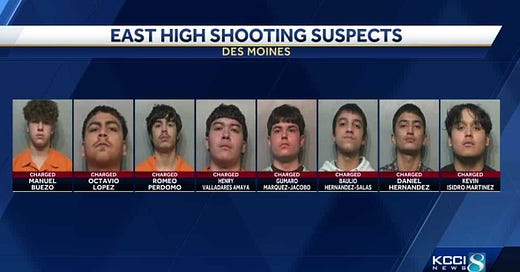School-shooting cases close, but questions about kids persist
Iowa needs more options to treat violent teens
What do we do with a kid who’s killed?
I am glad I don’t have to decide that question.
The final — and youngest — defendant in the 2022 drive-by shooting at Des Moines East High School received life in prison Friday. Because Nyang Mai Chamdual was only 14 at the time of the shooting, he has the possibility of parole. He turns 18 next month.
Our nation has suffered multiple school shootings before and since, so what happened on March 7, 2022, might be a blur. Teens riding in a three-vehicle convoy sprayed bullets at students outside of the school just before the last class period. Jose Lopez, 15, was killed, and two other teens — Kemery Ortega and Jessica Lopez Torres — were critically injured.
In the wake of the shooting, community leaders called for action. President Biden urged Congress to pass measures to reduce gun violence. Gov. Kim Reynolds said we already have enough laws, but we need to improve the education system and get kids in school.
The politicians have moved on, but the devastation remains for the families of the victims and the perpetrators.
In total, 10 teens ages 14 to 17 were charged. All were convicted: Three, including Chamdual, pleaded guilty to first-degree murder and received life sentences with parole. Four more pleaded guilty to second-degree murder and received sentences ranging from 20 to 70 years in prison.
How juveniles get second chances
In 2016, in State v Sweet, the Iowa Supreme Court banned life-without-parole sentences for offenders who commit murders while under age 18. There are still 27 states that allow “true life” sentences for juveniles.
Iowa also offers a sort of middle road between juvenile and adult courts for some defendants aged 15 or younger: Youthful offender status. This means the child is tried in adult court, but any sentence is deferred until their 18th birthday. The child remains in juvenile court supervision and often goes to the Boys State Training School in Eldora. (Iowa shuttered the training school for girls in 2014.)
The great news is that these boys often do well in the structured environment of the training school. Chamdual, the son of Sudanese refugees, lost his father before he turned 5 and spent much of his youth unsupervised and following bad influences, his attorney said. Over almost two years at the school, however, reports show that Chamdual exceeded expectations with his behavior, obtained his high school diploma, and did well in therapy and vocational training.
Another East High defendant who pleaded guilty of first-degree murder received his diploma and served on the student council and as a peer role model at the training school. Now 18, Alex Santiago Perdomo has graduated to prison, serving a life sentence with the possibility of parole.
At Chamdual’s sentencing, his attorney, Van Plumb, argued that because of his progress, he should receive a suspended sentence and be placed at a rehabilitation center, or be sent to prison for one year and then return to court for reconsideration.
“What do we do with Mr. Chamdual? That’s a hard question,” Plumb said. “How do you keep him on the straight and narrow?”
He acknowledged the problem that freedom offers: If Chamdual returns home, he is likely to “run with the wrong crowd” and reoffend.
Chief Judge Michael Huppert agreed with prosecutors that prison was the appropriate answer. The Board of Parole should decide when Chamdual is released, he said.
In cases like these, I wish for another middle road. Probation would not serve justice, the victims, or the community. But how much benefit would years in prison provide?
Most 18-year-olds are still kids because of their developing brains, and trauma and other factors can hamper their maturity and decision-making abilities. Before their offenses, these teens survived violence, abuse, abandonment, or hardships unimaginable to most of us. Sending them to a prison full of older, hardened criminals is an entirely different kind of “training school.”
What if, instead, Iowa invested in more secure, locked facilities exclusively for violent young adults that provided intensive treatment and accountability?
Another troubled teen faces unknown future
Another tragic example played out in a courtroom Thursday. Sixteen-year-old Jovahn Karhim Deon Mathis pleaded guilty to voluntary manslaughter and other charges in the death of an employee at Ellipsis youth home in Johnston.
Kathleen Galloway-Menke, 50, of Des Moines, worked with troubled youth like Mathis at Ellipsis. On May 8, 2024, the then-15-year-old became angry and left the home, and she and other workers followed. Galloway-Menke stepped in front of Mathis to prevent him from running into a busy street, and he shoved her so hard she flew into the air and hit the concrete. She died of a brain injury a few days later.
Now at the state training school, Mathis will return to court on July 31, 2026, just before his 18th birthday, and he will face up to 20 years in prison.
"Good luck, and behave yourself over the next year,” District Judge Paul Scott told the teen.
The clock is ticking. A year is not much time to show progress — for a 16-year-old, or for a society seeking answers.
Explore the impressive lineup of writers, plus Letters from Iowans, in the Iowa Writers’ Collaborative. They are from around the state and contribute commentary and feature stories of interest to those who care about Iowa.






Fourteen years old...so glad I don't have to make those types of decisions, either. So many great points in this column, Lynn.